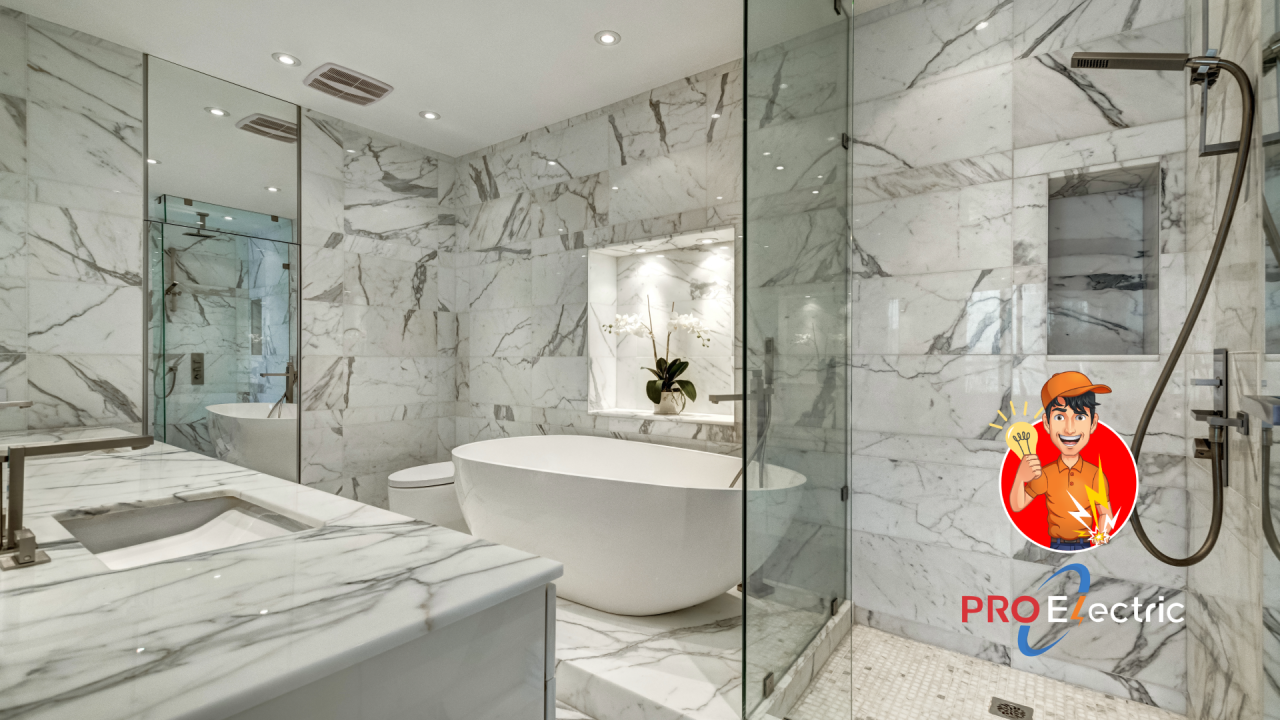Remodeling a bathroom involves more than just aesthetics.
Following proper electrical safety guidelines is crucial with multiple electrical circuits in play.
Mistakes can lead to serious safety hazards or costly repairs.
Here are the key things you should never do when working with electrical circuits during a bathroom remodel.
Don’t Skip the Electrical Permit
Why Permits Matter
Always obtain the necessary permits before starting any electrical work.
This ensures the project complies with local building codes and the work is inspected for safety.
Don’t Overload Existing Circuits
Circuit Capacity
Avoid adding new lighting or appliances to already overloaded circuits.
Installing new circuits to prevent tripping breakers or damaging wiring when increasing the electrical load is best.
Don’t Ignore GFCI Protection
Safety First
Ground Fault Circuit Interrupters (GFCIs) are required in bathrooms to protect against electrical shock, especially in wet areas.
Never skip installing GFCIs near sinks, showers, or bathtubs.
Don’t Use Non-Waterproof Outlets
Protect Against Moisture
Bathrooms are prone to moisture. Always install waterproof or water-resistant outlets to prevent electrical hazards caused by moisture seeping into outlets and switches.
Don’t Forget to Check Circuit Capacity
Plan for Electrical Load
Each circuit must handle new appliances, lighting, or heating devices.
Overloading a circuit can lead to blown fuses or even fires.
Don’t Install Light Fixtures Without Ventilation
Prevent Overheating
Light fixtures, especially in small spaces like bathrooms, need proper ventilation.
Installing fixtures in poorly ventilated areas can lead to overheating and potential electrical issues.
Don’t Overlook Outlet and Switch Placement
Keep Away from Water
Place outlets and switches safely away from water sources, like sinks and showers, to reduce the risk of electrical shock and ensure safety and code compliance.
Don’t Use Inadequate Wiring
Choose the Right Materials
Bathrooms require wiring rated for damp environments. Inadequate wiring can result in electrical failures and long-term damage.
Don’t Forget to Label Circuits
Future Maintenance
Label all circuits in your electrical panel to avoid confusion during future maintenance.
This makes it easier for you and your electrician to troubleshoot issues or make upgrades.
Don’t Rely on DIY Electrical Work
Hire a Professional
Licensed electricians should do electrical work in bathrooms.
Attempting DIY electrical work without the proper knowledge increases the risk of dangerous mistakes.
Don’t Fail to Separate Circuits for High-Power Devices
Dedicated Circuits Needed
High-power appliances like heaters, blow dryers, and heated floors should have their dedicated circuits.
Combining these with other circuits can cause overloads.
Don’t Mix Lighting and Power Circuits
Safety and Load Distribution
Keep lighting circuits separate from power-hungry devices.
This ensures even load distribution and minimizes the risk of electrical issues.
Don’t Skip Regular Inspections
Ensure Compliance
Once your remodel is complete, have a licensed electrician inspect the electrical system to ensure everything is safe and up to code.
Don’t Use Outdated Electrical Panels
Upgrade Your Panel
Old, outdated electrical panels may not be able to handle the increased load from new circuits.
Make sure your panel is updated to handle the remodel.
Don’t Forget to Plan for Future Needs
Think Ahead
When adding new circuits, plan for future upgrades.
Consider adding extra outlets for features like heated mirrors or towel racks, which may be added later.
Conclusion
Remodeling a bathroom with multiple electrical circuits requires careful planning and attention to safety.
By avoiding these common mistakes, you can ensure that your bathroom will be functional and safe for years to come.
Always consult with our licensed electrician to handle complex electrical work.



